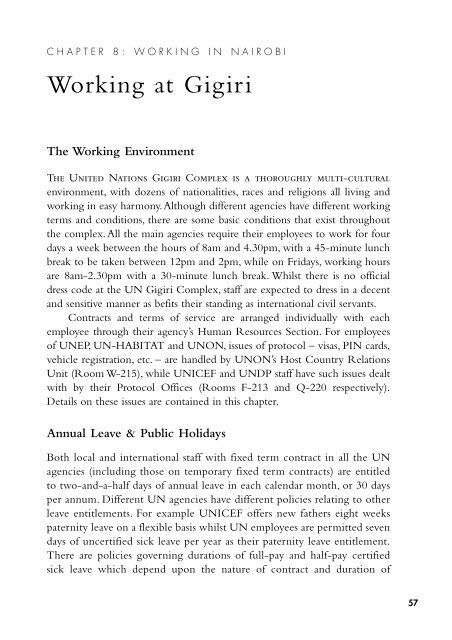KARIBU KENYA - UNON - the United Nations Office at Nairobi
KARIBU KENYA - UNON - the United Nations Office at Nairobi
KARIBU KENYA - UNON - the United Nations Office at Nairobi
Create successful ePaper yourself
Turn your PDF publications into a flip-book with our unique Google optimized e-Paper software.
CHAPTER 8: WORKING IN NAIROBI<br />
Working <strong>at</strong> Gigiri<br />
The Working Environment<br />
The <strong>United</strong> <strong>N<strong>at</strong>ions</strong> Gigiri Complex is a thoroughly multi-cultural<br />
environment, with dozens of n<strong>at</strong>ionalities, races and religions all living and<br />
working in easy harmony.Although different agencies have different working<br />
terms and conditions, <strong>the</strong>re are some basic conditions th<strong>at</strong> exist throughout<br />
<strong>the</strong> complex. All <strong>the</strong> main agencies require <strong>the</strong>ir employees to work for four<br />
days a week between <strong>the</strong> hours of 8am and 4.30pm, with a 45-minute lunch<br />
break to be taken between 12pm and 2pm, while on Fridays, working hours<br />
are 8am-2.30pm with a 30-minute lunch break. Whilst <strong>the</strong>re is no official<br />
dress code <strong>at</strong> <strong>the</strong> UN Gigiri Complex, staff are expected to dress in a decent<br />
and sensitive manner as befits <strong>the</strong>ir standing as intern<strong>at</strong>ional civil servants.<br />
Contracts and terms of service are arranged individually with each<br />
employee through <strong>the</strong>ir agency’s Human Resources Section. For employees<br />
of UNEP, UN-HABITAT and <strong>UNON</strong>, issues of protocol – visas, PIN cards,<br />
vehicle registr<strong>at</strong>ion, etc. – are handled by <strong>UNON</strong>’s Host Country Rel<strong>at</strong>ions<br />
Unit (Room W-215), while UNICEF and UNDP staff have such issues dealt<br />
with by <strong>the</strong>ir Protocol <strong>Office</strong>s (Rooms F-213 and Q-220 respectively).<br />
Details on <strong>the</strong>se issues are contained in this chapter.<br />
Annual Leave & Public Holidays<br />
Both local and intern<strong>at</strong>ional staff with fixed term contract in all <strong>the</strong> UN<br />
agencies (including those on temporary fixed term contracts) are entitled<br />
to two-and-a-half days of annual leave in each calendar month, or 30 days<br />
per annum. Different UN agencies have different policies rel<strong>at</strong>ing to o<strong>the</strong>r<br />
leave entitlements. For example UNICEF offers new fa<strong>the</strong>rs eight weeks<br />
p<strong>at</strong>ernity leave on a flexible basis whilst UN employees are permitted seven<br />
days of uncertified sick leave per year as <strong>the</strong>ir p<strong>at</strong>ernity leave entitlement.<br />
There are policies governing dur<strong>at</strong>ions of full-pay and half-pay certified<br />
sick leave which depend upon <strong>the</strong> n<strong>at</strong>ure of contract and dur<strong>at</strong>ion of<br />
57


